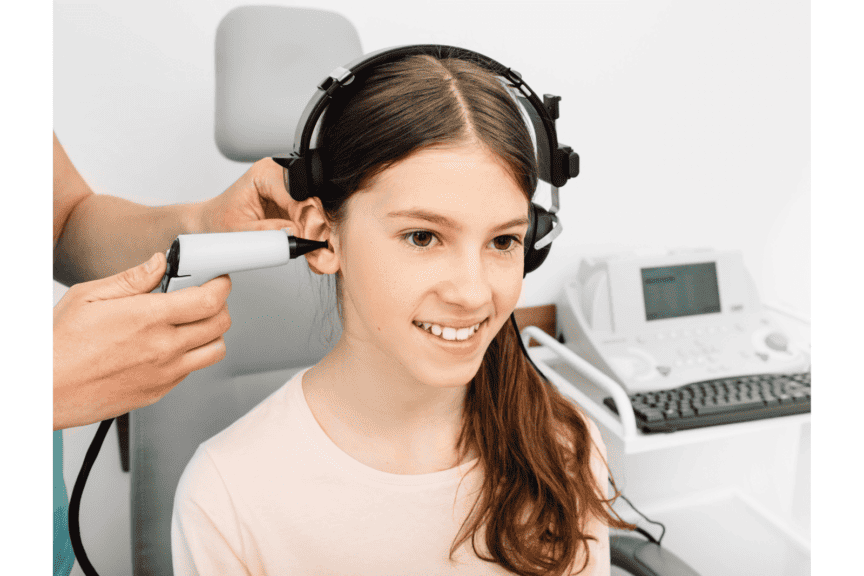Individuals of all ages should be able to enjoy the full richness of life through optimal hearing health. One topic that’s often overlooked is hearing loss in teenagers. While we tend to associate hearing issues with older adults, the reality is that adolescents are not immune to hearing loss. Hearing loss presents unique challenges for teens, but early intervention and support can make a world of difference.
The Prevalence of Hearing Loss in Teens
Hearing loss in teenagers is more common than you might think. According to recent data, approximately 1 in 5 adolescents in the United States experiences some degree of hearing loss. This statistic is a clear reminder that hearing issues can affect individuals of all ages, not just older adults.
Causes of Hearing Loss in Teens
Understanding the potential causes of hearing loss in teenagers is crucial for early detection and intervention. Here are some common factors contributing to hearing impairment in this age group:
- Loud Noise Exposure: Teens are often exposed to loud environments, whether it’s from concerts, sporting events, or personal audio devices like headphones and earbuds. Prolonged exposure to loud sounds can damage the delicate structures in the inner ear, leading to hearing loss.
- Recreational Activities: Participating in noisy recreational activities, such as attending sports events, going to music concerns, or even attending loud band rehearsals can put teens at risk of noise-induced hearing loss if proper hearing protection is not used.
- Infections: Ear infections, which can be common in children and adolescents, may result in temporary or even permanent hearing loss if left untreated.
- Genetic Factors: In some cases, genetic factors can predispose teens to hearing loss. While this type of hearing loss is usually detected in childhood, some hearing loss goes undetected for a number of years.
The Impact of Hearing Loss on Teens
Hearing loss can be particularly challenging for teenagers, as they are navigating the critical years of social and academic development. Adolescents rely heavily on effective communication to form relationships, excel in school, and discover their identities. When hearing loss enters the picture, it can lead to a range of physical, emotional, and educational challenges.
Teens with hearing loss may struggle in the classroom due to difficulties hearing teachers and classmates. This can result in lower academic achievement and decreased self-esteem. Hearing loss can also lead to feelings of isolation, as teens may avoid social situations where they feel left out or unable to communicate effectively.
The emotional toll of hearing loss should not be underestimated. Teens with untreated hearing loss are at a higher risk of developing depression and anxiety as they grapple with feelings of frustration and inadequacy. Untreated hearing loss can hinder the development of crucial communication skills.
Early Detection and Intervention
The key to mitigating the impact of hearing loss in teenagers is early detection and intervention. Parents, teachers, and healthcare professionals should be vigilant for signs of hearing impairment, which may include:
- Frequently asking people to repeat themselves.
- Difficulty following conversations, especially in noisy environments.
- Increasing the volume on personal audio devices.
- Inattentiveness in class or a drop in academic performance.
- Complaints of ear pain or discomfort.
If you or your teenager notice any of these signs, book a hearing test as soon as possible. Early intervention can make a profound difference in a teen’s life, preventing academic setbacks and emotional struggles.
Treatment Options
The treatment of hearing loss in teenagers varies depending on the type and severity of the hearing loss.
Hearing aids are the most common treatment option. For teens with sensorineural hearing loss, hearing aids can significantly improve their hearing and quality of life. Modern hearing aids are discreet, comfortable, and offer advanced features to enhance sound quality that can help teens at home and in the classroom.
In cases of severe to profound hearing loss, we may recommend cochlear implants. These devices can provide access to sound for individuals who do not benefit from conventional hearing aids.
Support and Understanding
Teenagers with hearing loss don’t need to navigate this journey alone. A strong support system, including family, teachers, friends, and your local audiologist can make all the difference. Let’s talk about how we can empower teens to lead fulfilling lives with the right hearing aids.

